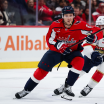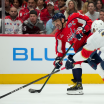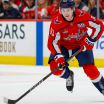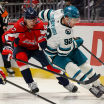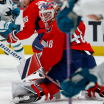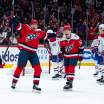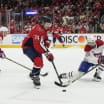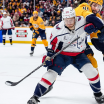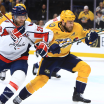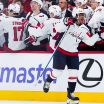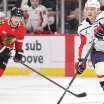Lars Eller scored probably the two most important goals in Washington Capitals franchise history, the overtime game-winner in Game 3 of their opening round Stanley Cup playoff series with the Columbus Blue Jackets, and the game-winner in the third period of the Caps' Cup-clinching Game 5 against the Vegas Golden Knights in Sin City on June 7, 2018.
Putting in the Work
Lars Eller has established himself as a key cog in the Capitals' forward group, and the Danish center has taken it upon himself to make sure he stays effective
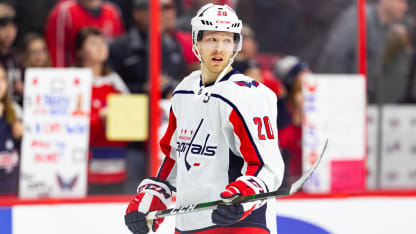
By
Mike Vogel
WashingtonCaps.com
He will never have to buy a drink in the DMV again, but the determined Dane isn't about to rest on those laurels. Eller turns 31 in a couple of months, but his game continues to be on the upswing, as it has been since midway through his first season here in the District.
"I think every year I've gotten better," says Eller, who came to Washington in a June 24, 2016 trade with Montreal. "We'd all like to have gone further in the playoffs that first year; we felt we had the capability and the personnel to do it. But I feel like I've gotten to be a better player as I went on, and I've added more and more to my game every year. So I like where I'm at now, especially considering the players we have around. Not all teams are fortunate to have players like [Nicklas Backstrom] and [Evgeny Kuznetsov] in their lineup, so I think there is just a natural fit for me here."
The need for a player like Eller became sadly and glaringly evident about a month and a half before his arrival in the District. In the second round of the 2016 Stanley Cup playoffs, the Caps were ousted in six games at the hands of the Pittsburgh Penguins, and specifically, the Penguins' third line of Carl Hagelin, Nick Bonino and Phil Kessel. The Caps top two forward lines more than held their own with the Pens' top six forwards, but Pittsburgh's third line was no match for Washington's third unit of Jason Chimera, Mike Richards and Andre Burakovsky, and that was ultimately the difference in the series.
By the time Game 6 rolled around, the Caps' had promoted Jay Beagle from the middle of the fourth line to the middle of the third, and they moved Burakovsky up to the second line so they could drop Justin Williams down to the third unit in an effort to compete with Pittsburgh's third unit. It didn't matter; Bonino scored the game-winner in overtime in that contest - the seventh goal for his line in the six-game set - ending the Caps' season.
Weeks later, the Caps dealt a pair of second-round picks to Montreal for Eller, aiming to fill that gaping hole in the middle of their third line. It worked, but not right away.
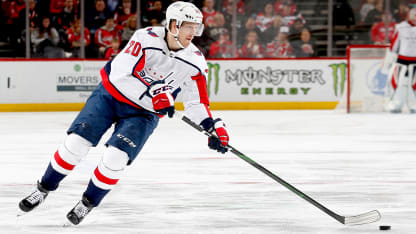
In the first half of his first season with Washington, Eller struggled. He took a lot of penalties - he was whistled for a minor penalty in five straight games at one point early in that first season - and he had just two goals and two points through his first 18 games here. Thirty-nine games into that first season in the District, Eller had just four goals and seven points, and he had 26 penalty minutes, only two shy of his total for 79 games in the previous campaign with Montreal. Even more alarming, he was playing only 13 minutes and change every night, down a couple minutes from the 15-plus he had played in Montreal.
He simply didn't have the trust and the confidence of the Caps' coaching staff at that point.
"That first season, I think I was still finding my way up until Christmas time," says Eller. "I was a little bit broken when I got here, and it took some time to find myself again. It wasn't like it came instantly after I got here; I feel like I really had to work for it. I think it started coming when I started competing a little harder, and everything else came down to confidence and touch. My instincts started to play a bigger role, and I think I started to play on my instincts more than ever."
Ironically, things began to turn for Eller when he put up three goals and five points in a four-game span midway through the season, with all three goals coming in two games against Pittsburgh. The points came steadily thereafter, he cut down on the penalties, and the minutes gradually increased.
Why was Eller "broken," to use his term?"
"A little bit of what kind of player I was," he answers. "I wasn't using my skill for long stretches, previous to coming here. I was getting by on working hard. I was getting by on competing. I wasn't using my abilities to my best, and I wasn't playing up to my potential. I think I was just getting by purely on winning battles and winning races. But you know, I had more to my game. And I think I've shown more and more since coming here."
A first-round pick (13th overall) of the St. Louis Blues in the 2007 NHL Draft, Eller debuted with the Blues as a 20-year-old in 2009-10, netting two goals in a seven-game trial. The following summer, he was sent to Montreal in the deal that brought goaltender Jaroslav Halak to St. Louis.
Eller spent six seasons with the Canadiens before the Caps liberated him from Montreal. Midway through his second season with the Caps - and roughly four months before hoisting the Cup in Vegas - Eller signed a five-year contract extension to remain in Washington.
He had a number of reasons to want to stay
"A lot of things - the culture on the team, the guys in the room, the coaching staff was a big plus, and just the laid-back atmosphere in the room," recounts Eller. "And I had a role where I worked my way up into more minutes and more responsibility.
"I just think I found my game here, more and more, and once you find something, it's worth more than some extra money - or potential extra money - going into free agency. And also, my family liked being here. It's been a good fit for all of us. So there really wasn't much not to like."
Almost four years down the road from the deal that brought him here, Eller has suited up for more than 300 games in a Caps sweater, and he just surpassed 750 games for his NHL career. Many players his age have started the downward arcs of their careers, their counting numbers getting a little bit smaller each season. That's not the case for Eller, who is on pace for a career high in goals (18, set in 2017-18), has matched his career high in assists (23) and has established a career best in points (39) in 2019-20.
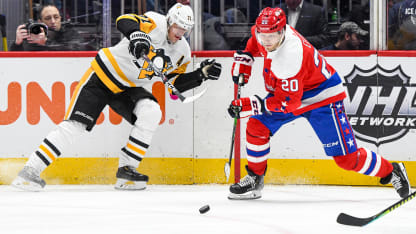
Given the circumstances of his season, Eller's output is somewhat surprising. He spent much of last season playing with Burakovsky and Brett Connolly, two players who departed over the summer, and who have combined to score 39 goals for their new teams thus far in '19-20, which is five more than the duo combined to score with the Caps last season.
Eller's new linemates - Hagelin and now Ilya Kovalchuk - have combined for just 18 goals through the first 80 percent of the campaign, but it hasn't had an impact on Eller's production
"Yeah, I've thought about it myself," says Eller. "I think with Burky and Conno, maybe I wouldn't have the puck as much as I do now, because these guys tend to give it to me faster because they know they'll get it back or because they want me to have the puck. So I have the puck on my stick more than I had before, to try to make stuff happen.
"I think in games early in the year, I replaced Kuzy when he was out, and I replaced Backy a little bit when he was out. So in those games I maybe got a few more offensive opportunities, and the points came easier there; I don't have the statistics on it. But I've had a good year so far. I still think I can be even a little bit sharper around the net. I think there are opportunities for more goals."
Over his time in D.C., Eller has elevated his game whenever he has been asked to fill in for Backstrom or Kuznetsov. That duo has missed a total of 26 games over the last four seasons, and Eller has totaled 17 points (two goals, 15 assists) during their absence.
Eller doesn't set personal goals for himself at the beginning of each new season, so his pursuit of career highs in all offensive categories is organic.
"I've heard people say that you should have goals and stuff, but I don't," he says. "I kind of thought about that approach, and had a little bit of that approach in the past, but I don't think it's for me because then you just come in and you're thinking about those numbers all the time. 'Oh, now I gotta do this to get to here.' And now you start forcing things. And now you're starting to think about doing things instead of thinking about the results and setting up the process, which you should be focusing on.
"So I think for me, it's just fun. Have fun, and make sure you have the joy in your game, and then try to be the best player on the ice every night. Try to be at your best every single day. Just one game at a time, don't look at what you should have after 40 games or 10 games or the points or minutes or faceoffs or whatever. Just whatever is right in front of you, just focus on that. I like that better."
That approach is working well for Eller, who has taken on greater defensive responsibilities this season with his new linemates. Both Richard Panik - who was Eller's linemate prior to the Feb. 23 trade for Kovalchuk - and Hagelin were injured early in the season, and it wasn't until mid-December that the threesome was finally reunited and put back together. The unit has clicked nicely since then, contributing consistently on the scoresheet, and often being deployed as a shutdown line against the opposition's top players.
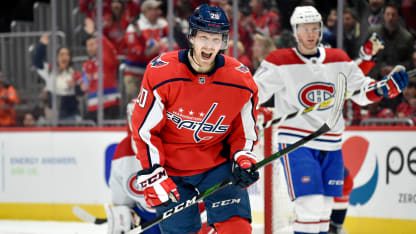
"I think we're doing a good job," says Hagelin. "We're creating good looks at 5-on-5, and the puck is starting to go in, and that's what we are going to need going down the stretch. There are going to be close games, and 5-on-5 goals are that much more important at this time of year. So if we as a line can continue - and even ramp it up a little bit offensively - that will be good for us.
"Lar is pretty easy to play with. You know what he is going to do; he likes to hold onto the puck, he likes to make plays, and he is good at creating space for himself."
Washington won consecutive mid-January home games over Carolina and New Jersey, respectively, with Eller's line leading the way and holding the opposition's top players off the scoresheet.
"Lars is a guy who really continues to improve every year," says Caps coach Todd Reirden, "and I've been challenging him with different things to improve and grow his game. The ability to use him up and down the lineup is huge for us. He has had a good run with [Jakub] Vrana and [T.J.] Oshie as well, so that gives us another spot to go to, but I think Lars thrives on challenges.
"I told him [before a game in January], 'You're playing against the other team's top line. Do you want me to let your linemates know?' And he says, 'No, no, I've got it. I'm going to talk to them.'
"That's something we've been working on is his leadership, and there is an example of him stepping up. I don't know what was said; at some point you have to guide your players in a certain direction, and then you let them act from there. And the results speak for themselves, in how his line did against [Carolina's Jordan Staal] and then [New Jersey's Travis] Zajac.
"It was an important part of our two wins, and I think that line with Hagelin and Panik are one of the better two-way lines in the league. All three guys can kill penalties, so we utilize them in different ways than we did when Burakovsky and Connolly were on that line. But somehow, Lars has still managed to continue to put up numbers and I'm really happy with his year."
This season, Eller's 55.8 shot attempt percentage (908 shot attempts for, 717 against) at five-on-five ranks first among Capitals with at least 25 games played and eighth among NHL centers. That currently marks the highest shot attempt percentage in a single season of his career. Should he finish the season with a 55.8 shot attempt percentage, it would mark the third-highest by a Capital since 2009-10, when the NHL began tracking the data (Alex Ovechkin: 57.6 percent in 2009-10; Nicklas Backstrom: 56.5 percent in 2009-10).
It's ironic that Hagelin is part of the reason for the Caps' pursuit of Eller in the deal with the Canadiens, and now the two are linemates, a year after Hagelin was added in a trade with Los Angeles, just ahead of the trade deadline in February of 2019.
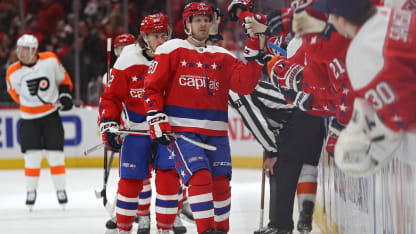
"He is your typical strong center," says Hagelin of Eller. "He is really good on the puck, really good on his edges. He is good at holding onto pucks and cutting back into the offensive zone, and he's got a good offensive mind as well. He is just an overall solid player who brings it every night.
"I think there are a lot of similarities between the two, Lars and Bonino. I think if you can have a good, strong third line it's important in the playoffs. Sometimes the star players are going to cancel each other out, and that's what happened there in 2015-16. I think our line probably had 10 goals in that series, and that was the difference. And they were all 5-on-5 goals, too."
After this season, Eller still has three more seasons on that five-year extension he signed a couple of years ago. And he still sees himself continuing the upward arc he has been on for a few seasons now.
"My anticipation has gotten better with every year," says Eller, "and with more and more experience, and I still think that curve can continue up. I think I have my best years ahead of me. It's definitely possible if you take good care of your body. There is no reason that you can't keep getting better. You might not keep getting stronger and faster, but you can still add things to your game in your 30s, I have no doubt about that."
Like his former teammate Brooks Orpik, Eller has rededicated himself to fitness and conditioning midway through his career, believing he will be able to extend his NHL career by doing so.
"If you look at your whole life, hockey might be a third of that, maybe a little more," says Eller. "You owe it to yourself to put everything you have into those years, because there is nothing like it that comes after. There is nothing like it. I say that like I've been through it, but I obviously haven't been through it. But that's what all the old players tell you when they're done."
Having the wisdom to listen to old players isn't a trait common to every player in the league, but having a father who coached the game at a high level probably makes one more receptive to such messages. Eller's dad, Olaf Eller, had a pro playing career of his own in Demark, a run that spanned the better part of two decades. The elder Eller is now the coach of the men's national junior ice hockey team.
"I think that comes just being around my dad coaching or playing in the early years, and my brothers all played," says the younger Eller. "So it becomes the most obvious thing that of course, I'm going to be a hockey player, and of course I'm going to be the very best hockey player I can be. When you see the people around you having that strong of a passion for something, you adopt that passion. And now I'm here."
Indeed he is, and while individual goals in single seasons don't motivate him, he is extremely proud of being the first Danish player to win the Stanley Cup and to bring it home to Denmark. His day with the Cup in his hometown of Rodovre was a massive event that attracted thousands of onlookers, some of them waving and cheering from the windows of nearby buildings.
Having won the Stanley Cup and not being interested in single-season goals, there is one goal out there that would please Eller greatly, but it's not him who brings it up, but rather a reporter who wonders what it might mean to Eller if he were to retire one day as the all-time leader among all Danish-born NHL players
Currently, Detroit center Frans Nielsen holds that distinction with 896 games. But Nielsen is nearly 36 now and is clearly winding down a distinguished career in the league; he has nine points this season, down from 35 in 2018-19. Eller is second on that list, some 142 games behind Nielsen. It would take a couple of seasons to get there, but it's doable. And from the proud smile he flashes when asked about it, it would be a meaningful goal for Eller.
"I would certainly be very proud of that," he admits. "I'm already proud of where I am, but I would take big pride in taking care of myself so well that I can play the longest possible in this league. I want to stay as long as possible as I can in this league and I really do think that with technology nowadays and biohacking, there's really opportunities for age to become less of a factor as you go into your thirties. I really believe that."
And while he is at it, maybe a few more meaningful goals in the postseason, too. Eller has certainly shown that knack, to the gratitude of thousands in these parts.

